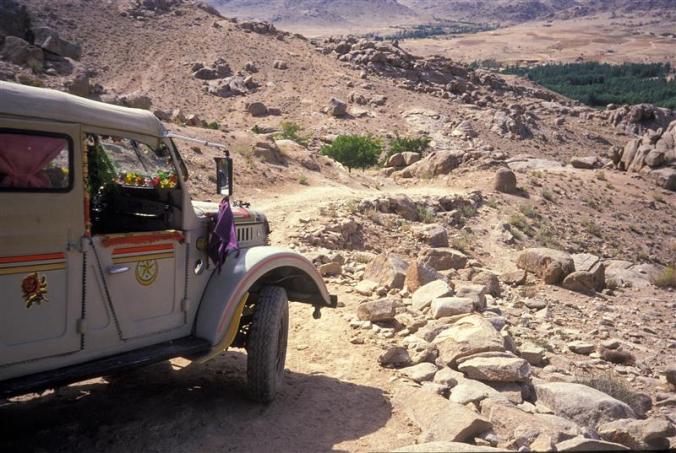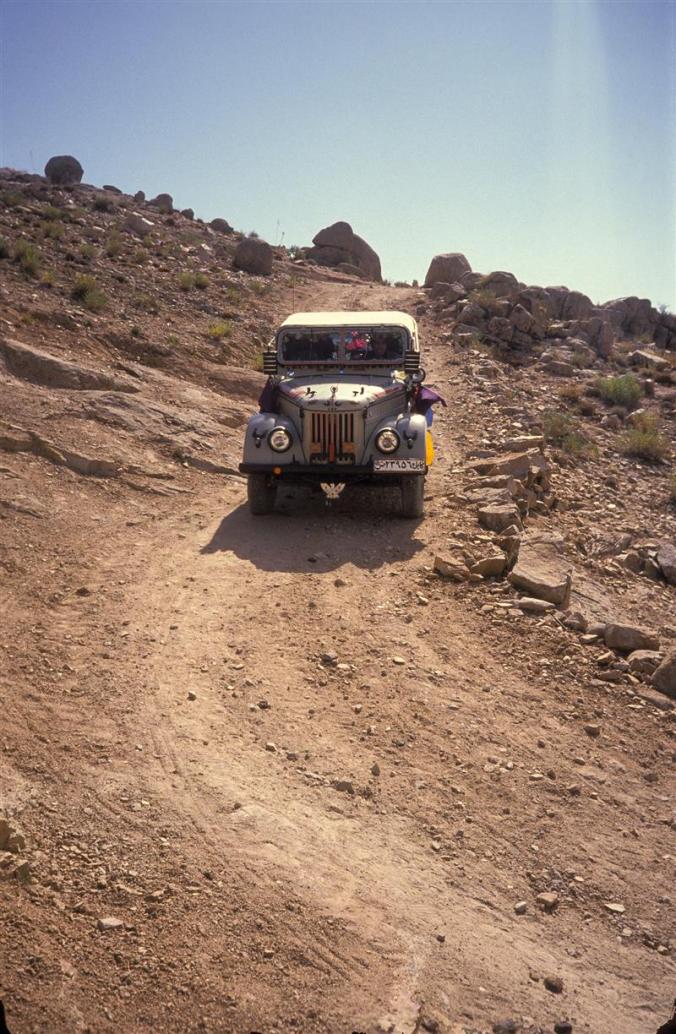As the clinic was soon to have a vehicle, a driver, Jawad, was appointed. When, through his network of cousins and uncles he heard of a jeep coming on the market in Angoori bazaar he and Hussain went off one morning to check it out.
The noise of an engine signalled their return late in the afternoon and we rushed out to greet the arrival of a beaming Hussain and his magnificent ‘Model Konah’ Russian jeep. On the threshold I stopped, stunned into silence at the sheer frightfulness of the vehicle.
The windscreen was so adorned by garlands of plastic flowers and other shrubbery, the driver’s visibility was reduced to almost nil. The floral theme was continued by chintzy curtains at the side windows while, suspended from the front bumper, was a collection of chains and medallions, chiming and chinking in the breeze. When Jawad put the vehicle into reverse a female voice with an American twang proceeded to warn, ‘Attention Please, this car is backing up. Attention Please this car is backing up.’

The jeep which became Hussain’s pride and joy
The enthusiastic spectators who had gathered welcomed the jeep, as they would a bride to her new home, by bombarding it with sweets.
Hussain so loved the chintzy curtains he at first refused to remove the side windows – they did not open, having to be completely removed – but when his passengers all became faint and nauseous from the terrific heat inside he did reluctantly allow the windows to be taken out.
Now he had transport, Hussain was eager to try to find a leprosy patient he’d received news of. By now he had registered two, previously untreated, patients who had come to the clinic but this man apparently lived in a village some distance away. We set off one morning to find him, with only the vaguest of addresses and directions.
At a fork in the road, Jawad stopped. The road on the right curved around the side of a mountain. ‘That’s the road to take,’ said Ismail. ‘It’s a short cut which joins this road again on the other side of the mountain.’

The road round the mountain.
‘Are you sure?’ asked Jawad. ‘It doesn’t look very wide.’
‘Oh, yes, even big trucks use that road,’ Ismail replied with great authority so Jawad turned onto the mountain track. Half an hour later, increasingly concerned at how narrow the road had become, he stopped, insisting Ismail accompany him on foot to investigate further ahead.
A shame faced Ismail re-appeared to break the news the track simply disappeared about a quarter of a mile further on. There was nothing for it but to go back the way we’d come. Except the road was already too narrow to allow Jawad to turn the vehicle so we had an agonizing thirty minutes of American accented ‘Attention please, this car is backing up’. My suggestion of pulling out a wire produced such a look of horror on Hussain’s face the idea was quickly dropped. I nursed a slight hope the mechanism might self-destruct under the strain of overuse but the nasal tones rang out with what seemed to be an increasingly persistent warning. Finally Jawad decided that it might be better to risk falling down the mountain in the middle of a three point (well, probably six) turn, rather than witness his passengers have nervous breakdowns.

Ismail assured us the road was wide enough for big trucks
Hussain asked everyone we met on the road, and in a village shop but no one knew of our patient. One man thought he knew of a person with leprosy and gave directions to a farm. The way was obstructed by a small river whose muddy banks were too soft to bear the weight of the jeep so Hussain and Ismail continued on foot to the farm, returning after almost an hour looking thoroughly fed up. Eventually Hussain had to admit defeat and abandon the fruitless search.
A whole day wasted, leaving us tired and with a guilty niggle that perhaps we had not done enough to find the missing patient. Perhaps he was afraid his neighbours would ostracise him if it was known he had leprosy and he didn’t want to be found. To cheer everyone up I introduced the game of ‘I Went to Market and Bought’ which, played in English, soon had everyone laughing as they struggled to remember the ever lengthening alphabetical shopping list.
A second outing, to the home of one of the newly registered leprosy patients was more successful. The family were obviously very poor and the room in which we sat, although spotlessly clean, had nothing more than one threadbare gilim on the floor and a bright red geranium in a pot on the windowsill. The patient, Moosa, had been referred to Hussain by a doctor in Angoori bazaar – one of the few doctors in Afghanistan who knew anything about leprosy. Moosa had long been suspicious the tell-tale anaesthetic patches indicated the dreaded disease. Like many others, he had tried to hide the signs, afraid once it was known he had leprosy, he would be forced by the community to live as a social outcast. The doctor assured him the disease could be cured and sent him to Hussain.

The jeep in all its glory!
At the clinic Hussain had explained how easy it was to cure the disease if Moosa took his medication regularly, and promised if he followed advice he need never suffer from the deformities which have made leprosy a disease feared throughout history. During the house visit Ismail began to teach the patient how to protect and care for his feet, showing him how to rub off the hard skin with a stone, how to soak and oil his feet each day to prevent cracks in the skin which, if left untended could cause ulcers.
While all this was going on I examined the women and girls in the family. This caused great hilarity, especially when one little girl ran away, screaming hysterically, convinced I was about to give her an injection. She was brought back and tearfully submitted to the examination after which she joined in the general laughter.
The family invited us to stay for lunch. None of us felt we should burden this poor family with the cost of feeding us but Moosa was insistent. Hussain whispered to me we should accept in case he thought we were refusing to eat with him because he had leprosy. There were many apologies for the humbleness of the meal but, served with simple dignity, the large bowl of yoghurt, crisp spring onions, fresh, warm bread and salt became a banquet.
Mary, the banquet meal at the end is so touching … when we give from our hearts and what we have, we truly give our all! A terrific post a always and I was transported to away with you all!
LikeLiked by 1 person
Yes, it’s a meal I’ve never forgotten, Annika. Hope you are not too bruised by travelling in the jeep on those ‘roads’ 🙂
LikeLiked by 1 person
The hospitality of such poor people is heartbreaking. I was left imagining that they had nothing left to eat after sharing what they had.
The old Russian Jeep being a status symbol is all the more understandable in the midst of such poverty.
Best wishes, Pete.
LikeLiked by 1 person
Probably only bread and onion, Pete. Certainly they could not afford to eat meat. Such hospitality and generosity was humbling. The real status symbol, which Hussain hankered after was a Toyota Landcruiser, for which we did not have the funds. To be honest those old Russian jeeps were able to go places a Toyota couldn’t.
LikeLiked by 1 person
💜💜
LikeLiked by 1 person
Pingback: A-R International: Mary Smith | Books: Publishing, Reading, Writing